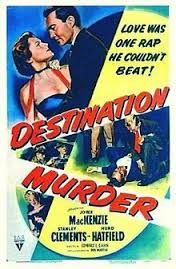
DESTINATION MURDER
US, 1950, 75 minutes, Black-and-white.
Joyce Mac Kenzie, Stanley Clements, Hurd Hatfield, Albert Decker, Myrna Dell.
Directed by Edward L. Cahn.
Destination Murder is a supporting feature from RKO, 1950s style. It is a crime drama, a gangster drama, a police investigation, all with touches of film noir. The film is brisk, and has enough twists to keep audiences attentive. But it is the kind of material that would be sufficient for an hour’s episode in a contemporary police series.
The film opens with a good device, Jackie (Stanley Clements), a petty criminal and messenger boy, goes out at interval at the movies to have a cigarette and buy popcorn for his girlfriend, but is picked up by a driver, goes to a house, shoots a man, returns to the movies as if he had just been in the foyer. A suspect is pulled in by the police but he is not the murderer. The daughter of the murdered man (Joyce Mac Kenzie) had seen something of the killer and his car. While she is interrogated by the police, she decides to investigate on her own, picking someone from the police lineup, ingratiating herself with him, following him to a club which makes her more suspicious where (rather unlikely given the style of the actress) she gets a job as a cigarette girl.
There are quite some complications with the alleged boss (Albert Decker) who always refers to himself in the third person, is actually a cover for the real boss, the manager, played by suave but sinister Hurd Hatfield (The Picture of Dorian Grey). There also seems to be a homosexual subtext in his character and dialogue.
There is also a smart girl played by Myrna Dell who tricks the killer into writing a confession and then uses it for her own purposes. She too is murdered as is the cover boss.
It all builds up to a confrontation, a taping of the conversation, and the shootout with the villain.
1. An interesting supporting feature of 1950? Crime, gangsters, police investigation, twists?
2. The black-and-white photography, the city, the movies, the clubs, offices, police precincts? Musical score?
3. The title, the reference by the police at the end?
4. The opening, the movies, Jackie and his going out, killing his victim, returning to the cinema?
5. The lineup, Laura and the invitation of the police, identifying Jackie, her wanting to investigate, the police warning her off?
6. Laura and her meeting with Jackie, his being deceived and his showing off with her? Going to the club, his being bashed by Armitage? His wanting to blackmail? The reactions of Stretch – and playing the pianola during the bashing? And the audience believing that Armitage was the boss?
7. Laura, suspicions, going out with Jackie, considering his car, the money, his going to the club to get more money from his friend? The bashing? Her leading him on? Going to the club, the interview with Stretch, turning on charm, getting the job, with the cigarettes, getting the information, the discussions with Alice? Going up to Armitage, his being intrigued? Her interactions with Stretch, the plans for marriage, not believing that he was the arch-criminal, the taping, with the gun, the finale and the shootout?
8. Jackie, with Alice, writing the confession, her keeping it? The continued blackmail? Jackie and his being killed?
9. Armitage, gross, the relationship with Stretch? His being used? With Alice, thinking she would marry him? With Laura? The setup, the gun, his being shot?
10. Stretch, suave, the manager, the control? With Alice in the plan, the confession? With Laura? To marry her or not? His dialogue – and the suggestions of homosexuality?
11. Alice, shrewd, gold-digger, with Armitage, with Stretch, with Jackie and the writing of the confession, the turning it over? Have being killed?
12. The initial suspect, imprisoned for his safety is being set up? His participation in the final plan?
13. The police, investigations, suspicions, the final fight and the solution?